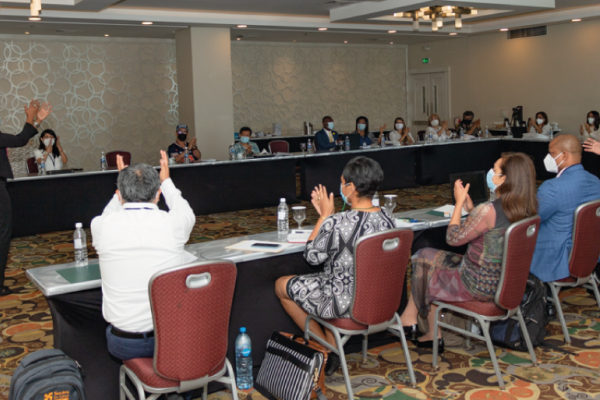More than 20 civil society organizations (CSOs) from Latin America and the Caribbean participated in the TB CLAVE - LAC regional workshops for advocacy to improve access to TB health services for migrant populations held in Santo Domingo, Dominican Republic.
Migration and demographic mobility are a pending public health challenge, due to the social and health conditions faced by this population (poverty, overcrowding, lack of access to health services, housing and sources of work, among others), situations of inequity that favor the emergence of tuberculosis and other diseases that hinder control, treatment and follow-up, making them a vulnerable population.
“It is gratifying to know that there are civil society organizations that, like the NGO Desarrollo y Autogestión (DYA), prioritize their actions in the fight against TB with little or no funding. We cannot allow this disease to be “forgotten” again, there are still many people affected who require much more than attention and support. Many times they remain hidden, a fact that deprives them of access to health services and that in many cases the state is not present, but civil society is,” said Silvia Charcopa, representative of the CSO Desarrollo y Autogestión (DYA), Ecuador.
In the face of this problem, Partners In Health (Partners In Health), in alliance with the TB Coalition of the Americas, launched the KEY-LAC TB PROJECT, which aims to strengthen the capacities of civil society in the knowledge, advocacy and implementation of public policies that benefit access to health and human rights of persons deprived of their liberty and migrant population in Latin America and the Caribbean.
As part of the activities, on May 25 and 26, the first “Regional workshop for political advocacy to improve access to TB health services for the migrant population” was held. This activity brought together representatives of civil society organizations from Latin America and the Caribbean, the coordinator of the Regional TB Observatory, and the technical secretaries of the TB Social Observatories of Mexico, Colombia, Guatemala, El Salvador, Dominican Republic and Haiti.
The activity began with the presentation of the experiences of civil society work on TB and migrant population by the Sociocultural Movement of Haitian Workers (MOSCTHA), Dominican Republic, Development and Self-Management (DyA), Ecuador and the Casa del Migrante, Guatemala.
In addition, a proposal for a regional action plan to address TB for migrant populations was presented, explaining the methodology followed for the development of the advocacy plan, which is based on a technical document analyzing the regional context of the TB situation among migrants. This regional analysis was developed through a consultancy of the OBSERVA TB project, a multi-country grant from the Global Fund to Fight TB in Latin America and the Caribbean, carried out in 2020.
The proposed plan presented model activities that could be directed and managed by civil society organizations to make the problem visible in the region and to advocate for improved access to TB health services for this vulnerable population.
Also, throughout the workshop, each of the phases of the action plan were presented: situation analysis, identification of problems and alternative solutions, stakeholder analysis, key messages, objectives and activity plan. In addition, each phase included discussion spaces to encourage the participation of civil society organizations, receive contributions from the participants, which allowed for the validation of the regional action plan and encouraged reflection on priority activities on the issue in the region and in each of the countries represented.
At the end of the workshop, the Regional TB Network LAC “SIN FRONTERAS”, a regional working group focused on addressing TB in the migrant population, was formed, which established the following objectives:
- To maintain interest in working on the TB problem in this vulnerable population in the Latin American and Caribbean region.
- To share relevant information on national and regional TB issues in migrant populations.
- To provide feedback on the achievements or progress made by civil society organizations that have TB interventions in this vulnerable population.
- To create spaces for mutual collaboration in the fight against TB with emphasis on addressing this key population.
“Civil society is a key player in identifying and improving the response to the needs of TB patients since they have the possibility of providing close and timely accompaniment in the consumption of medicines and the channeling of services to meet their needs. We hope to continue participating in these spaces in which good practices are shared,” said Viery Franco, representative of the Socio-Cultural Movement for Haitian Workers (MOSCTHA), Dominican Republic.
We appreciate the participation and contribution of the civil society organizations and each of their representatives:
Silvia Charcopa (Desarrollo y Autogestión DYA - Ecuador), Viery Franco (MOSCTHA - Dominican Republic), María Durán (Semillas para la Democracia - Paraguay), Julio César Cruz (PROSA - Peru). Olga Leones (Corporación Pazaporte - Colombia), José Antonio Granillo (Albergue Las Memorias AC - Mexico), Melany Martínez (Casa del Migrante Guatemala de los Misioneros de San Carlos Scalabrinianos - Guatemala), Marvin García (ASONAPVSIDAH - Honduras), Juan Alonzo González (Asociación Nuevos Horizontes Panamá - Panama), Kathy Eridania Brito García (Asociación Dominicana de Enfermos y Afectados por TB - ASODENAT - Dominican Republic), Héctor Javier Sánchez Pérez (Observatorio Social de TB - Mexico), Sandra Escandón (TB Social Observatory - Colombia), Máximo Isaías de Jesús (TB Social Observatory - Dominican Republic), Luis Sánchez (TB Social Observatory - Guatemala), Catherine Serpas (TB Social Observatory - El Salvador), Madge Dorcelus (TB Social Observatory - Haiti), Valeria Macías (Partners in Health - Mexico), Leonid Lecca (Socios En Salud - Peru), Helen Marin (Socios En Salud - Peru) and Alberto Colorado (TB Coalition of the Americas).
At Partners In Health, we are aware that tuberculosis is a social disease linked to poverty and living conditions, so it is necessary to strengthen the contribution of society in access, responsiveness and quality of health care services to the problem of tuberculosis through advocacy, communication, education, social mobilization, research and innovation, public policies among others, which prioritizes highly vulnerable populations.
